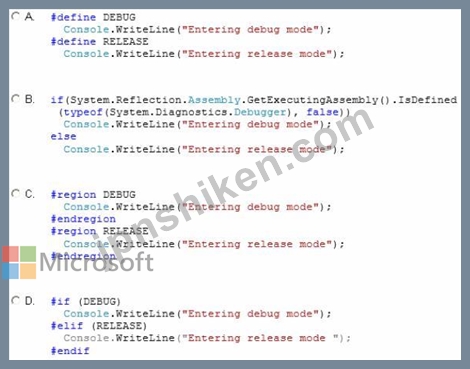有効的な70-483J問題集はJPNTest.com提供され、70-483J試験に合格することに役に立ちます!JPNTest.comは今最新70-483J試験問題集を提供します。JPNTest.com 70-483J試験問題集はもう更新されました。ここで70-483J問題集のテストエンジンを手に入れます。
70-483J問題集最新版のアクセス
「305問、30% ディスカウント、特別な割引コード:JPNshiken」
次の要件を満たすコンソールアプリケーションを作成する必要があります:
* アプリケーションがデバッグモードでコンパイルされている場合は、コンソール出力にEntering debug modeと表示されなければなりません。
* アプリケーションがリリースモードでコンパイルされている場合は、コンソール出力にEntering releaseモードが表示されている必要があります。
あなたはどのコードを使うべきであるか?

* アプリケーションがデバッグモードでコンパイルされている場合は、コンソール出力にEntering debug modeと表示されなければなりません。
* アプリケーションがリリースモードでコンパイルされている場合は、コンソール出力にEntering releaseモードが表示されている必要があります。
あなたはどのコードを使うべきであるか?

正解:D
Explanation
#elif lets you create a compound conditional directive. The #elif expression will be evaluated if neither the preceding #if (C# Reference) nor any preceding, optional, #elif directive expressions evaluate to true. If a #elif expression evaluates to true, the compiler evaluates all the code between the #elif and the next conditional directive. For example:
#define VC7
//...
#if debug
Console.Writeline("Debug build");
#elif VC7
Console.Writeline("Visual Studio 7");
#endif
Incorrect:
Not B:
* System.Reflection.Assembly.GetExecutingAssembly Method
Gets the assembly that contains the code that is currently executing.* Assembly.IsDefined Method Indicates whether or not a specified attribute has been applied to the assembly.
* System.Dignostics.Debugger Class
Enables communication with a debugger.
Property: IsAttached
Gets a value that indicates whether a debugger is attached to the process.
#elif lets you create a compound conditional directive. The #elif expression will be evaluated if neither the preceding #if (C# Reference) nor any preceding, optional, #elif directive expressions evaluate to true. If a #elif expression evaluates to true, the compiler evaluates all the code between the #elif and the next conditional directive. For example:
#define VC7
//...
#if debug
Console.Writeline("Debug build");
#elif VC7
Console.Writeline("Visual Studio 7");
#endif
Incorrect:
Not B:
* System.Reflection.Assembly.GetExecutingAssembly Method
Gets the assembly that contains the code that is currently executing.* Assembly.IsDefined Method Indicates whether or not a specified attribute has been applied to the assembly.
* System.Dignostics.Debugger Class
Enables communication with a debugger.
Property: IsAttached
Gets a value that indicates whether a debugger is attached to the process.
- 質問一覧「100問」
- 質問1 Customerというクラスを含むアプリケーションを開発しています。...
- 質問2 あなたは、アプリケーションを開発しています。 アプリケーショ
- 質問3 あなたは次のクラスを持っています。 (行番号は参照用にのみ記
- 質問4 アプリケーションが扱われていないNullReferenceExceptionとForm...
- 質問5 Nameという名前のプロパティを持つProductという名前のクラスが...
- 質問6 次のコード行があります。 Type type1 = typeof^MyClass); タイ...
- 質問7 情報を画面に出力するC#コンソールアプリケーションを開発して
- 質問8 あなたは、EmployeeRosterという名前をつけられるクラスを開発し...
- 質問9 あなたは、ユーザからの日付の入力を受け付けるアプリケーション
- 質問10 あなたは次のコードを持っています: (Exhibit) 次の各文につい...
- 質問11 Microsoft Access 2013データベースからデータを取得するメソッ...
- 質問12 あなたは、マイクロソフトVisual Studio2013を使ってアプリケー...
- 質問13 次の要件を満たすコンソールアプリケーションを作成する必要があ
- 質問14 .xmlファイルを受け入れる既存の受注処理システムがあり、 次の...
- 質問15 C +で書かれた外部アセンブリ1、アセンブリ1 Iのメソッドを呼び...
- 質問16 次のC#があります(行番号は参照用としてのみ含まれています)
- 質問17 あなたは次のコードを持っています: (Exhibit) 答えるには、コ...
- 質問18 あなたはC#を使ってアプリケーションを開発しています。 アプリ...
- 質問19 ページングを使用するアプリケーションがあります。 各ページに
- 質問20 アプリケーションは、ストリームからXMLを直列化および逆直列化...
- 質問21 文字列strJsonが有効なJSON文字列かどうかを検証する必要があり...
- 質問22 エラーが発生したときにログファイルの情報を表示するアプリケー
- 質問23 あなたは、C#を使用してアプリケーションを開発しています。 ア...
- 質問24 あなたはアプリケーションをテストしています。 このアプリケー
- 質問25 あなたは、次のコードを持っています。 (行番号は参考のために
- 質問26 あなたは次のクラスを持っています: (Exhibit) IEquatableを実...
- 質問27 Assembly1とAssembly2の2つのアセンブリがあり、C#で記述されて...
- 質問28 Applという名前のコンソールアプリケーションを作成しています。...
- 質問29 カスタム例外タイプのセットを実装するアプリケーションを開発し
- 質問30 あなたはC#を使ってアプリケーションを開発しています。 あなた...
- 質問31 あなたは、C#を使用してアプリケーションを開発しています。 ア...
- 質問32 あなたはC#でアプリケーションを開発しています。 アプリケーシ...
- 質問33 あなたは、ProcessDataはという名前の新しいメソッドを実装して...
- 質問34 あなたはアプリケーションを開発しています。 整数をパラメータ
- 質問35 あなたは次のコードを持っています。 string MessageString = "T...
- 質問36 カスタム例外タイプのセットを実装するアプリケーションを開発し
- 質問37 Microsoft SQL Serverデータベースにアクセスするアプリケーショ...
- 質問38 Microsoft ADO.NET Entity Frameworkを使用してMicrosoft SQL Se...
- 質問39 productsという名前のProductオブジェクトのコレクションがあり...
- 質問40 文字列入力としてaParamという名前のパラメーターを取る関数を開...
- 質問41 あなたはアプリケーションを開発しています。 このアプリケーシ
- 質問42 プレイヤーが0から1000までのコインを収集するゲームを開発して...
- 質問43 あなたは、値型と参照型の間で転換を実行するFloorTemperatureと...
- 質問44 あなたは、図書館の本を追跡するためのクラスという名前BookTrac...
- 質問45 UpdateScoreというパブリックメソッドをScoreCardという名前のパ...
- 質問46 あなたは、以下の方法(行番号は参考のために含まれるだけです)
- 質問47 長時間実行するタスクを実行するProcessDataという名前のメソッ...
- 質問48 あなたは、C#を使用してアプリケーションを開発しています。 開...
- 質問49 あなたはアプリケーションを開発しています。 アプリケーション
- 質問50 あなたは次のコードを持っています。 (Exhibit) 入力番号が0より...
- 質問51 あなたはアプリケーションをテストしています。 このアプリケー
- 質問52 アプリケーションは、ストリームからXMLを直列化および逆直列化...
- 質問53 注:この質問は、同じシナリオを提示する一連の質問の一部です。
- 質問54 Messageという名前のパブリッククラスには、SendMessage()メソ...
- 質問55 Employeeという名前のクラスを作成しています。クラスはEmployee...
- 質問56 Assembly1.dllという名前のアセンブリを作成します。 Assembly1....
- 質問57 C#を使用してメソッドを作成しています。 このメソッドは3つの...
- 質問58 あなたは次のクラスを開発しています: * Class1 * Class2 * Cla...
- 質問59 ProcessDataという名前の新しいメソッドを実装しています。 Proc...
- 質問60 GetDataという名前のメソッドを含むアプリケーションを開発して...
- 質問61 Productという名前のクラスを含むC#アプリケーションを開発して...
- 質問62 次の要件を満たすコンソールアプリケーションを作成する必要があ
- 質問63 あなたは、次のコードを持っています。(線番号は参考のために含
- 質問64 カスタム例外タイプのセットを実装するアプリケーションを開発し
- 質問65 あなたは、以下の方法(行番号は参考のために含まれるだけです)
- 質問66 あなたは、Employeeと従業員の一般的なリストと呼ばれるクラスを...
- 質問67 あなたは次のコードを見直しています: (Exhibit) 次の各文につ...
- 質問68 あなたは、C#を使用してアプリケーションを開発しています。 あ...
- 質問69 Windows Forms(WinForms)アプリケーションを開発しています。...
- 質問70 注:この質問は、同じシナリオを提示する一連の質問の一部です。
- 質問71 Customerという名前のクラスとcustomersという名前の変数があり...
- 質問72 あなたは、FullNameと名付けられたクラスを使うアプリケーション...
- 質問73 あなたは番号のリストを処理するアプリケーションを作成していま
- 質問74 次の要件を満たすコンソールアプリケーションを作成する必要があ
- 質問75 あなたは、ファイルのためにハッシュ価値をつくるGenerateHashと...
- 質問76 あなたは次のクラスを持っています (行番号は参照用にのみ含まれ...
- 質問77 あなたは以下のクラス定義を持っています。 (Exhibit) Shapeから...
- 質問78 あなたは次のコードを持っています。 (Exhibit) myDataリストか...
- 質問79 あなたは、64ビットのC#アプリケーションをデバッグしています...
- 質問80 あなたは、optimize performanceに複数の非同期仕事を使うアプリ...
- 質問81 あなたは次のコードを持っています。 (Exhibit) すべての製品と...
- 質問82 あなたは、ウェブ・アプリケーションで使われるクラス・ライブラ
- 質問83 あなたは次のC#コードを持っています。 (行番号は参照用にのみ...
- 質問84 あなたは、アセンブリを開発しています。 アセンブリが開発され
- 質問85 あなたはC#を使用してアプリケーションを開発しています。アプ
- 質問86 アプリケーションは、次の形式でJSONデータを受信します。 (Exhi...
- 質問87 Orderという名前のクラスを含むアプリケーションを開発していま...
- 質問88 あなたは、パスワードをWindows Azure SQL Databaseデータベース...
- 質問89 次のC#コードがあります。 (Exhibit) コードの出力は何ですか?...
- 質問90 あなたは、C#を使用してアプリケーションを開発しています。 ア...
- 質問91 Microsoft Visual Studio 2013でアプリケーションを構築していま...
- 質問92 C#アプリケーションの例外を処理するコードを記述しています。 ...
- 質問93 あなたは動物園の動物についての情報を管理するアプリケーション
- 質問94 EvaluateLoan、ProcessLoan、およびFundLoanという名前のメソッ...
- 質問95 CustomerというクラスとOrderというクラスがあります。 顧客クラ...
- 質問96 App1という名前のコンソールアプリケーションを作成しています。...
- 質問97 あなたは、データベースから読むアプリケーションを作成していま
- 質問98 Orderという名前のクラスを含むアプリケーションを開発していま...
- 質問99 以下のインターフェースを実装する予定です。 (Exhibit) 次の方...
- 質問100 あなたは、パフォーマンスを最適化するために複数の非同期仕事を

